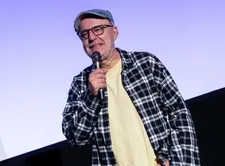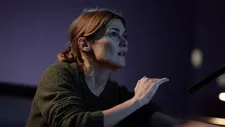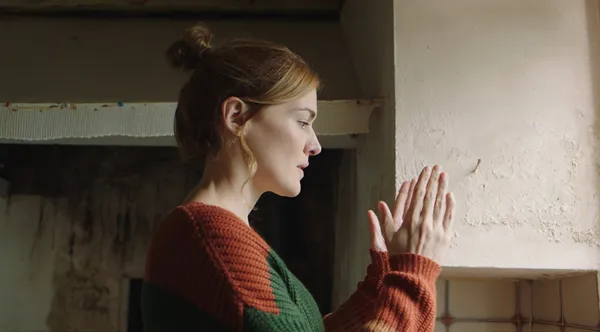 |
| Juanjo Giménez introducing Out Of Sync in Edinburgh Photo: Courtesy of EIFF |
Juanjo Giménez's feature Out Of Sync, co-written by Pere Altimira and starring Marta Nieto, focuses on a workaholic sound designer, who becomes afflicted with a mysterious illness. In a development that feels very in tune with our times of streaming and Zoom calls while trying to navigate the pandemic, her hearing begins to slip out of sync with not only her job but the wider world, with the situation worsening in tandem with her personal circumstances. The end result, which as you would expect features excellent sound design, starts off in thriller territory but then becomes much more ambiguous in terms of genre and content as more fantastical elements start to creep in. We caught up with Giménez to talk about the origins of, and craftwork in, the film, when it screened at Edinburgh Film Festival last month.
Amber Wilkinson: When you were first thinking about the film did you come at it from the sound perspective - which is its crucial element - or did you come to it from the central character?
Juanjo Giménez: The first idea was to play with somebody and image, the first version of the script had the working title Delay. It was the idea of playing with this out of sync issue. And then the character arrives later. The first idea was to play only with image and sound, to have a kind of universal disaster that a delay would arise and erase mankind. It was like a 20 minute short film. And then we decided to expand because we thought the idea was really interesting. And then we invented this character, the sound designer, because we thought that this is the kind of disease that only a sound designer can have. It is the delay who chooses the patient and not the other way. So, first came the delay and then the rest.
AW: I feel in a way, the film arrived at the perfect moment in that we've all spent time locked up in our own houses watching films that maybe are slightly out of sync on Netflix or on a Zoom call with things kind of not quite in sync. I feel like it's maybe struck more of an emotional chord than even you anticipated.
JG: With out of sync issues there's always a bit of anguish, I mean, our brain doesn't accept the out of sync issue very well, you get anxious when you watch a film. With zoom, and Skype, and so on, we experience the delay when we watch people's lips moving, and then the sound arrives five, ten seconds later, we get nervous and anxious. We tried to put that in the movie, playing with this kind of mirror between the internal emotional state of the character and the disease and the delay. That's the starting point. There are also other things in the movie, even autobiographical, because my house is in the movie. But the first idea was for sound and the image and that's it.
AW: Even the organising of the film was out of sync in a way, because didn't your star Marta Nieto approach you rather than you approaching her?
 |
| Juanjo Giménez on writing with Pere Altimira: 'We try to know everything about the story, everything about the character. And then we start this process of subtraction' |
AW: And it's not an easy role because she's having to react to things that aren't there.
JGP: At some points during the shooting, we helped her because, for example, there is a sequence when she hears her mother during the movie, we had a playback to help. But in other situations it was a kind of imagination. For example, when she follows her voice, that's technical work on her part. So it was really difficult but she's really great. And I mean, she's almost in every scene, she has the movie on her shoulders.
AW: How was it to work with the sound team, because you're asking them to do something that maybe goes against the grain.
JG: Yes but it was a challenge. And I thought that for every sound designer it's like a dream to be working on a film like that because sound is its protagonist. So you can play with things that in other films are impossible. Maybe you can do the wrong things in order to get the film right, something like that. But it was like a great challenge for them. And they enjoyed not only in post-production, but even in the shooting the guy versa. And he was not only making the normal work, but helping the main actress to be in the character with playbacks and trying to read even really played with internal air forms in order to to have the next one when she's unable to speak at the studio. So for them it is like a big challenge. But they were eager to try things. And it was really a great, great opportunity for them.
AW: I feel like mood is really important to you with your work. Your short Timecode is also big on mood. Something is happening but, essentially, it's a moody, enigmatic short. And I feel that enigmatic quality is also present in Out Of Sync.
JG: You're right, but I'm really bad at analysing my own work. In some interviews, they told me that maybe there is a kind of mirror thing between Out Of Sync and a Timecode because of this issue of playing with communication. In Timecode you have night and day and you're communicating with somebody through screens, not directly. There is this lack of direct communication in both things. But maybe this kind of mystery. I love not to explain it too much to the audience. I think maybe these days, we over-expose things in film.
AW: If anything, your film becomes more mysterious as it goes along, by the midway point you realise it's not just a thriller, it's something much more ambiguous. When you're writing, do yourself looking for those things that are maybe more ambiguous, a bit more unknown, mysterious.
 |
| Juanjo Giménez: 'I love not to explain it too much to the audience. I think maybe these days, we over-expose things in film' |
AW: When you work with your co-writer, do you bat the script backwards and forwards or do you sit down together?
JG: We talk a lot. And then we imagine the outline of the story and we talk a lot. Even in that film, we had some meetings with the actress in order to have some feedback, because she's not the writer, of course, but she was so involved in the process. So we wanted to check, we even tried to rehearse some sequences beforehand because it was unknown territory. I tried to check other films about out of sync ideas and it was impossible to find, because maybe there are some things with Marguerite Duras or experimental films, but not a narrative film, which plays with things out of sync. So it was a big challenge for me and for the rest of the team but it was, in the end, very rewarding.
AW: You premiered in Venice last year and here we are nearly a year on. I assume by this point you're working on new projects?
JG: I've made another short film because I love making short films. I consider myself a short filmmaker. BIt's finished. It's maybe in two weeks and I'm writing another feature to shoot next year. Let's hope so. The feature has some science fiction points but it's a different thing. I'm writing another project, maybe for TV, but it's in the early stages.The short is called Mussol, which means owl in Catalan. The main character is an owl who crashes against glass - that's the starting point. It's 15 minutes and it's ready for sending to festivals. It's a black comedy.






















